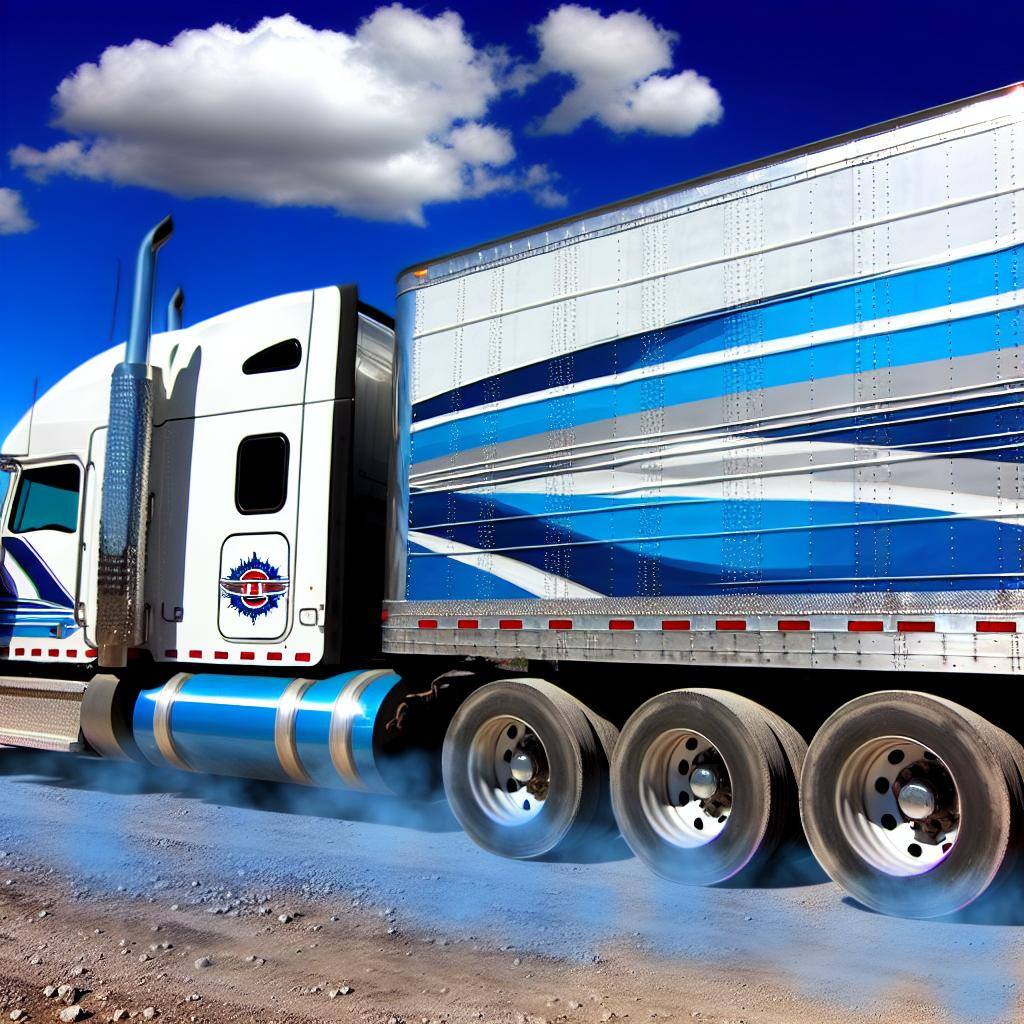Trailer tracking systems have emerged as indispensable tools for fleet managers seeking to gain real-time visibility into the movement and status of their trailers and assets. However, the true value of these systems lies not just in tracking trailers but in the wealth of data they generate, which can be leveraged to drive strategic decision-making and operational excellence. From optimizing route planning and asset utilization to enhancing cargo security and maintenance scheduling, the possibilities are endless when it comes to harnessing the power of trailer tracking data. Let’s explore how fleet managers can unlock the full potential of a trailer tracking system and revolutionize their logistics processes for greater success and competitiveness.
Increase Your ROI by Investing in AirFinder Everywhere
- Loss Prevention. Reduce the amount of loss that occurs during the supply chain process
- Location Coverage. AirFinder Everywhere uses a combination of GPS, Cellular, and WiFi to determine location everywhere
- Security Alerts. Know when a delay in shipment has occurred so the problem
can be addressed immediately.
Why You Need to Collect Data From a Trailer Tracker
Fleet managers are being encouraged to collect data about their trailers in order to improve logistics operations and facilitate future transformations. This data includes anything from location information to environmental conditions. All this data after being collected can be used by fleet managers to make strategic decisions. It also can be used to feed AI so it can make decisions based on data that has been collected. Without the data that trailer tracking software provides, fleet managers face security risks and can’t make strategic decisions. When fleet managers make decisions based on a guess, they are more likely to increase unnecessary spending. Without data, you can’t determine whether or not a decision or investment is worth the cost, nor can you easily identify areas of the supply chain that need to be improved.
1. Optimize Route Planning
Trailer tracking plays a pivotal role in optimizing route planning through the analysis of historical tracking data. This data gives fleet managers a comprehensive understanding of their trailers’ movements, enabling them to devise the most efficient and effective routes. By leveraging this data, fleet managers can identify recurring traffic patterns, road conditions, and delivery schedules, which are crucial factors in route optimization. Armed with this knowledge, fleet managers can strategically plan routes that minimize fuel consumption and reduce travel time. For example, if certain routes consistently experience heavy congestion during specific times of the day, trailer tracking data can highlight these patterns, allowing fleet managers to adjust their schedules or explore alternative routes to avoid delays. Since trailer tracking provides real-time visibility into the location and status of trailers, fleet managers can make informed decisions on route adjustments as conditions change. By dynamically rerouting vehicles based on live data, trailers can adapt to unforeseen circumstances such as traffic accidents or road closures, ensuring timely deliveries and customer satisfaction. Trailer tracking can also facilitate the optimization of delivery sequences by providing insights into the proximity of assets to various destinations. By strategically sequencing deliveries based on asset locations and customer proximity, companies can minimize travel distances and maximize delivery efficiency.
2. Asset Utilization
Through the implementation of a trailer tracking solution, fleet managers can effectively monitor the usage, availability, and performance of their trailers, enabling them to make informed decisions to maximize asset utilization. By leveraging the data collected from asset tracking systems, fleet managers can understand asset utilization patterns, usage trends, and idle times. This data is what fleet managers need to identify underutilized assets and optimize their deployment to ensure maximum efficiency. For example, if certain trailers are consistently unused for prolonged periods, fleet managers can reallocate these trailers to other locations where they are needed, thereby minimizing waste and maximizing productivity. Knowing asset utilization also plays into maintenance scheduling which we’ll dive deeper into soon. If trailers aren’t being used or are being overused, the frequency of maintenance will need to change. Without the knowledge on usage, there is no way to determine if the maintenance activities taking place are sufficient. Understanding the usage of trailers is key for making decisions surrounding operational efficiency.
3. Maintenance Scheduling
By leveraging trailer tracking data, fleet managers can develop proactive maintenance schedules based on asset usage patterns and performance metrics, ensuring that maintenance tasks are conducted at optimal times to minimize disruption to operations. One way asset tracking optimizes maintenance scheduling is by enabling predictive maintenance strategies. By analyzing historical data on asset performance, fleet managers can set up alerts for conditions like shock and schedule maintenance tasks proactively to address issues that may have occurred. Using a trailer tracker allows maintenance tasks to be scheduled based on the actual condition of the asset rather than fixed time intervals. By continuously monitoring trailer usage, fleet managers can identify which trailers have a higher level of wear and tear so maintenance can be scheduled on those first. This approach allows businesses to optimize maintenance schedules and allocate resources more efficiently by focusing maintenance efforts on assets that truly require attention, rather than adhering to rigid maintenance schedules that may result in unnecessary downtime and costs. By leveraging trailer tracking data, fleet managers can implement predictive and condition-based maintenance approaches to optimize maintenance schedules.
4. Compliance
A trailer tracking system keeps accurate records of trailer and asset location, usage, maintenance history, and other pertinent information that is essential for demonstrating compliance with various regulations and standards. One way trailer tracking has helped companies maintain compliance is through asset monitoring capabilities. Trailer trackers have embedded sensors to monitor conditions like temperature and shock. One area where this information is useful is within the cold chain monitoring space. The tracking devices monitor the temperature inside of the trailer and will send an alert to fleet managers if the temperature falls out of range. This way the problem can be addressed before spoilage occurs. The temperature will also be documented throughout the trip so if there is a concern from the FDA or another party, you can show the documentation as proof of compliance. Trailer tracking also keeps track of asset chain of custody by maintaining records of asset ownership. Since these tracking devices can be placed on the trailer itself and the cargo inside of the trailer, you can have documentation of which trailer the cargo is in and which warehouse it was dropped at. By tracking asset movements and transactions in real time, fleet managers can ensure that the cargo is properly accounted for and that discrepancies are promptly identified and addressed. The collection of trailer tracking data provides companies with comprehensive reports and audit trails to demonstrate compliance with regulatory requirements. This not only helps companies avoid penalties and fines associated with non-compliance but also enhances transparency and accountability in asset management practices. By collecting and maintaining accurate records of information on key assets, companies can easily demonstrate compliance with various regulations.
5. Asset Security
GPS trailer tracking helps companies optimize trailer security by monitoring trailer movements and activities in real time, allowing them to identify and address suspicious or unauthorized activities promptly. For example, our AirFinder Everywhere solution has geofencing capabilities that will send alerts to fleet managers when a boundary is crossed. If this breach was unauthorized, action can be taken immediately. This stops theft and ensures the safe return of assets. Sometimes this prevents a simple mistake from being made. Either way, it saves money since the loss is fixed immediately and no replacements are needed. Trailer tracking makes asset recovery easy in the event of theft or loss by providing accurate location data and historical tracking information that can be used to trace and recover stolen or missing assets. Companies can provide law enforcement with the location reports of trailers and assets to aid in the recovery and retrieval of stolen assets, increasing the likelihood of successful recovery and minimizing financial losses. Tracking the location of trailers and other valuable assets is the best way to maintain asset security. The tracking device would likely deter thieves from stealing the asset, but even if it doesn’t, the tracking capabilities make recovery simple.
Which Trailer Tracking System Should Be Used?
There are a variety of trailer tracking systems on the market. This is because they have become increasingly important for companies to have. Our solution AirFinder Everywhere is the first of its kind, offering seamless indoor and outdoor tracking in one solution. It has all the features you’d look for in a trailer tracking system, including geofencing, alerts, asset monitoring, and more. All these features help you to secure your assets while improving overall supply chain efficiency. The data you’ll collect will allow you to make strategic decisions that will help you receive return on your investment. Upon installation, you’ll realize how much money you’re wasting on inefficient operations and replacing lost assets. But you don’t have to waste any more. This solution will save you money and transform your operations in a way unimaginable.
Will You Collect the Data You Need?
The data collected from a trailer tracking system offers companies a wealth of opportunities to optimize their operations, improve efficiency, and drive strategic decision-making. Through the innovative utilization of trailer tracking data, companies can optimize route planning to minimize fuel consumption and reduce travel time, enhance asset utilization to maximize resource efficiency, and so much more. By harnessing the power of data collected from trailer tracking systems, fleet managers can gain valuable insights that enable them to make informed decisions, streamline their logistics processes, and achieve greater success. As technology continues to evolve and new advancements in data analytics emerge, the possibilities for leveraging trailer tracking data to drive business innovation and growth are endless. It is essential for companies to embrace the transformative potential of trailer tracking systems and capitalize on the opportunities they offer to stay ahead of the competition and thrive in an increasingly digital and data-driven world. To learn more about our solution and how it can transform your operations, book a demo with us!





